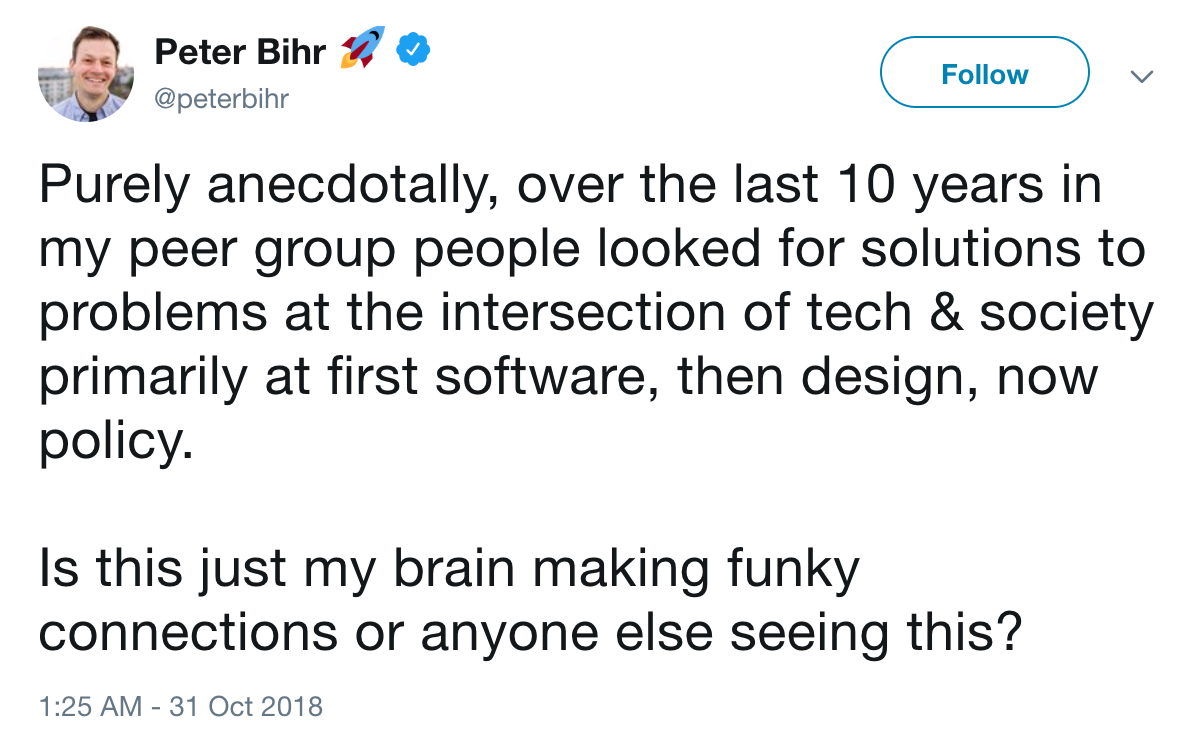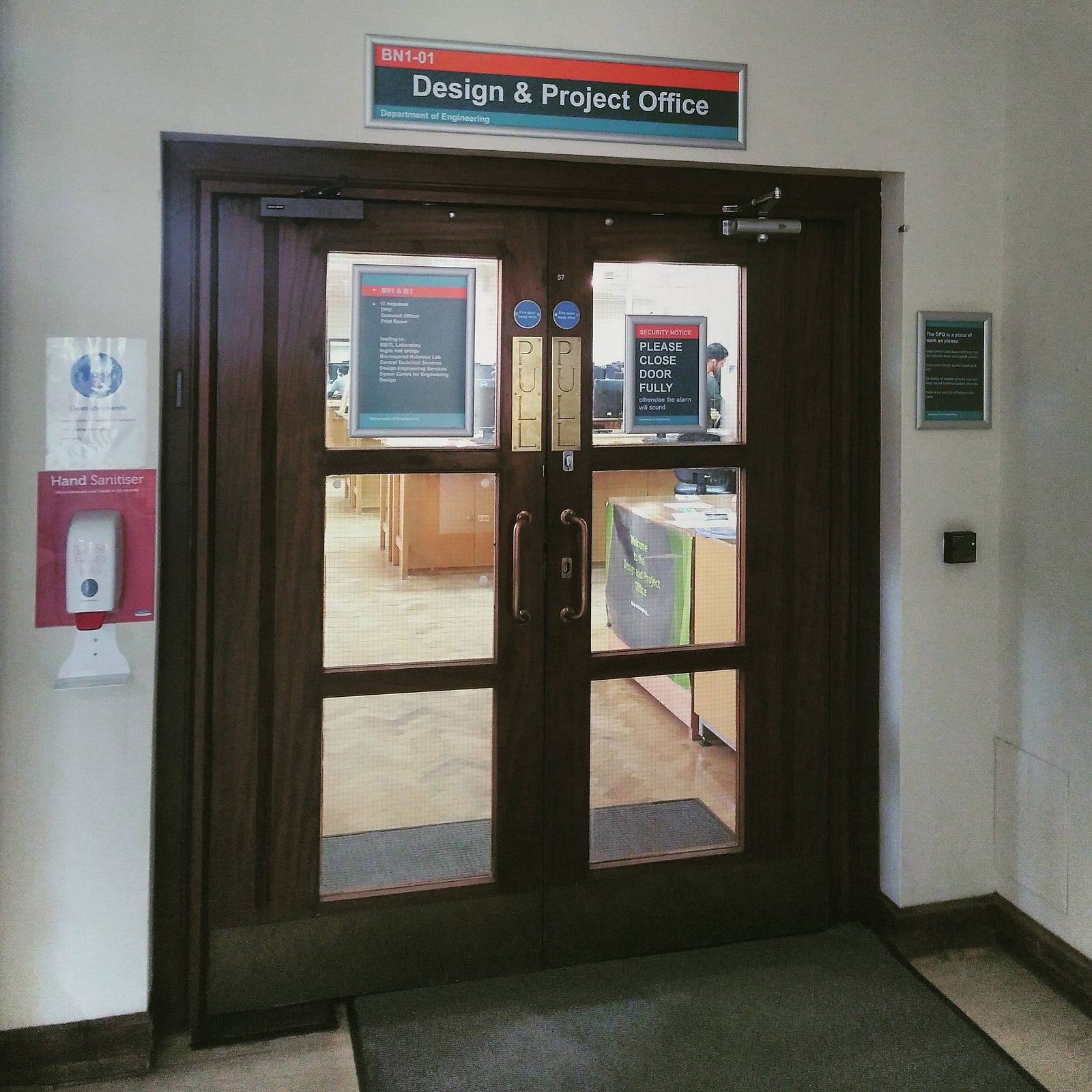weeknotes: kindness and economics
A lot more about people than technology at the moment.
Carnegie published a report from Julia Unwin about kindness and emotions in public policy, which is fascinating in drawing out some of the tensions between efficiency and other public service success measures, and kindness. A good read.
It reminded me of Cassie Robinson’s emphasis on generosity, especially in thinking about networks and collaboration. I wanted to come back this week to reflect in more depth on her post about strengthening and protecting what matters most, but realise I’ve not much to say other than that it’s a different perspective I don’t often encounter. I like the different examples that help bring ideas of the social sector to life, especially as the whole idea of the social sector is one which still feels quite new to me. It’s not a concept I came across until recently — I think other circles would talk about a mix of public sector and third sector which isn’t terribly descriptive. The blend of community, infrastructure, shared spaces (parks, libraries, community centres, places of worship), different organisations and informal groups, is a useful framing.
A strong social infrastructure is important — not just because of what it helps to solve — isolation, crime, education, addiction, political polarisation, and even climate change — it’s what it can help prevent and strengthen too — what it can make us resilient to.
I also like this slide — something to reflect on in different contexts:
Even in seemingly technical conversations, such as with the Centre for Smart Infrastructure and Construction, turn out to be all about people and how they relate to one another (as well as to the connected systems they make and use). We’re planning an event about risk in complex systems later this year, and the relationship between trust and risk. Bigger risks are covered in Martin Rees’s new book, reviewed here by Diane Coyle, who observes:
Martin Rees thus ends by calling for scientists to engage more with philosophy. I think they should be engaging more with social scientists. The barriers to taking action to safeguard humanity from any devastating effects of climate change or AI are not mainly about science and technology, but rather about what people believe and how they behave.
I think something similar applies to the tech ethics space now — philosophy is all very well, but we need to consider more the ways people live and interact with each other, to build greater empathy for people who may be very different from us. (I think this is missing in some of the push for a people’s vote on Brexit — whilst on one level I think that’s a great idea to avoid a calamitous result, I find the lack of understanding of some folks of why others voted (and might vote again) for an exit.
Also quite a lot of economics this week. I feel I could use a richer understanding of economics, but it seems that classical “economics 101” wouldn’t give me what I need. It keeps coming up though and I don’t feel I have the tools to think about it properly. Peter Bihr’s recent tweet left me thinking that for me, economics is where I’m looking now; I don’t find the policy space so exciting, perhaps a mix of the pace and type of work.
I struggle with podcasts; so often there’s not a high enough ‘signal to noise’ ratio for me and I tune out, and there’s no way to skim and focus on the interesting parts. (Nonetheless, we’re starting to produce some audio contentabout Trust & Technology — podcasts coming soon!) So I was glad to find a transcript (much easier to skim, and decide which bits to read more deeply) of this Wharton podcast on measuring the economy.
Mariana Mazzucato: I think it’s key to remember that so many of the causes of the crisis, unfortunately, have not been remedied. We are brewing the next crisis. The previous one was caused by private debt, not public debt, and the ratio of private debt to disposable income is back at record levels. We haven’t reformed finance. We still have most of the financial sector really just financing itself. It’s what we call FIRE — finance, insurance and real estate — and this is why it continues to outpace the growth of the rest of the economy. We have an overly financialized business sector that is increasingly using profits not to fund actual activities like production, research and development, training for workers, but just purchasing back their own shares to boost stock prices and stock options, and — surprise, surprise — executive pay.
This is really problematic. The economy is still sick, and this is worrying 10 years after the crisis.
Hmm.
I was lucky to have some time for a relaxed chat with Irene Ng last week too. Conversations with Irene always leave my brain full, and this was no exception. Of course we touched on HAT matters, and the importance of intellectual property rights as a framework for thinking about personal data which doesn’t mean we depend on regulation, but allows the realities (and inevitabilities) of the market to play too. But the real takeaway message for me was the idea of economics as a design discipline — creating new places and moments for transactions or exchanges of value.
In more technical things, I liked the idea of “tech done right” from a conversation with John Dunford of the Developer Society. This seems to capture the sweet spot of the intersection of responsible technology and tech for good. As this Simprints article illustrates, doing tech for good doesn’t mean you don’t have to work at being responsible (or that everyone does, for that matter). Thanks John!
It’s a bit, but not entirely, like Bruce Schneier’s public interest technologists (is this a new site? Anyway, a useful list of organisations thinking like this)
We need technologists who work in the public interest. We need public-interest technologists. … I think of public-interest technologists as people who combine their technological expertise with a public-interest focus, either by working on tech policy, working on a tech project with a public benefit, or working as a more traditional technologist for an organization with a public benefit.
The idea of civic futures, visions which are built from a civic perspective, is described here. This seems a useful idea, as it’s much more common to encounter futures developed from a government perspective, or those which boost a specific technology, or even aid futures, which often seem to bring their own political perspective, even if deeply rooted in local community needs and culture. It feels like there’s something really important in how we think about groups rather than individuals. Just as Doteveryone’s researchshowed that people feel tech has benefited them as individuals, but that society has not done so well out of it, how can we think about designing and developing technologies that are less about the individual user, and more about groups and communities, at whatever scale? This might be a harder design challenge, and trickier to measure (those nice automated counts of how many users are active each month, for instance, are not so important here), but that’s no reason not to try.
And so from groups and communities, to collective ownership and more thinking about the ownership of technology.
I’ve been reading David Edgerton’s Shock of the Old, which finally got to the top of my book pile. David talks about how we can think differently about the history (and significance) of technologies if we focus on technologies in use (and who is using them when), rather than invention and innovation. This includes considering who owns and controls the technologies (and indeed the question of who funded them shapes the history and public perception of technologies, too). As well as the historical perspective on tech, this feels like a useful way to think about today’s technologies, getting us away from the focus on the hero inventor/innovator (Musk, Zuckerberg, Jobs, Bezos, Gates) onto the real experiences of using these technologies, and who gets to use them in what contexts. Maybe we sometimes focus on the wrong technologies, too. David has several examples where the apparently significant technology that we have embedded in our understanding of history may not be as significant as other technologies, which achieve similar ends but are used by more people or have more impact. David moves on to explore how technologies come and go — it is not the relentless forward/upward path that a tech mindset tends to have. Bicycles were big in the past; now they are big again. We had Concorde offering supersonic passenger flight, but no longer. How do our internet technologies, subject to so much debate at present, especially social media, appear in this sort of framework?
Shock of the Old is to hand because I finally finished Nathan Schneider’s Everything for Everyone. I’d really recommend this — a fascinating read full of ideas and stories. There will, I think, be new and engaging content for all readers — whether you are interested in tech or co-ops or inequality, or none of these. Go read it. I had been looking forward to it, and it exceeded my expectations, with unexpected stories of unlikely activities, big and small.
Here are a few bits which particularly stood out for me —
“I don’t want to build commons for people who talk about the commons,” he [Duran] said. “I want to build commons for commoners.”
This really resonated with me — so much talking about the future of technology, and comparatively so little useful building!
But also a good point even about those who are building different tech (which reminds me of some of my motivation behind Digital Life Collective — that although it is hard, you have to have scale in your economic/political interventions to make a dent):
Like sipping fair-trade coffee and tending a community-garden plot, my commitments to Emacs and May First produce limited macroeconomic effect. “Goldman Sachs doesn’t care if you’re raising chickens,” political theorist Jodi Dean once remarked.
A useful reminder of the tech bubble, and the inequality of access to VC financing:
The active ingredient that has brought the platform economy to life is venture-capital financing. Most people can be forgiven for not knowing much about it, because it’s not for them. It’s a trick almost exclusively available to privileged subcultures in a small number of highly networked urban tech hubs, unknown to virtually everyone else who might want to get a business going.
On tech culture (and true even of radical, open source, decentralised tech culture):
But education also happens through culture. Cooperative tech will need festivals more inclusive than Burning Man, journalism less gaga for startup bros than Wired, and a geography that doesn’t concentrate the gains into unaffordable places like Mountain View and Palo Alto.
I realised I had never thought of commonwealth as common wealth.
Constructing a commonwealth means insisting on principles while tolerating compromise.
As is true for so many community, for-good, and non-profit projects.
The week saw some more technical stuff too. I caught up with some of the plans for RChain, and took part in the first startup ethics interviews for the Machine Intelligence Garage. A real diversity of machine learning startups there; it was fascinating to learn about them.
I bumped into Steve Song at Mozfest, and was really encouraged that Mozilla is supporting him as a fellow to look at the bottom two layers of the internet, as well as the higher layers we tend to think about in tech and society conversations. Takes me back to my PhD! Steve’s article from earlier this year looking at network access — the basics of who gets online and how in different parts of the world — also touches on questions of money and politics, and how much of these lower network levels we actually have access to information about.
Affordable access to communication is now of such value as a social and economic enabler that it is no longer appropriate to talk about strategies that connect “most” of the population. We need strategies that can embrace all levels of society and all regions. Fortunately, market and technological trends have created new possibilities for the development of affordable access solutions. But in order to have a meaningful conversation about those options, we need better data on current telecommunications network development.
Another blast from the past this week was visiting the Engineering Department for a University committee meeting, in the Board Room, where I was last for staff-student joint committee meetings as an undergraduate. The room is sadly reduced in grandeur, with cheaper tables and chrome and black leather chairs replacing what I recall as solid wood versions. Other things remain the same:
At the meeting it was good, indirectly, to see how all the hard work on open access in the Open Knowledge community over the years (a tiny fraction of which is showcased here) has made a real difference to policy around publishing (at corporate, university, and research funding levels).
A few other bits:
More on recycling — a fascinating article on Apple and their use of recycled aluminium. Quoting Adam Minter in this piece — “Apple’s marketing department has a history of taking the most prosaic of technologies and spinning them as revolutionary.”
We’re starting to plan the 2019 Festival of Maintenance, and already had some new volunteers stepping up to help. It’s not too late if you’d like to be involved — we’re hoping to be in the North of England this time. Also, let us know what dates (Saturdays, in Sept/Oct) we should avoid!
This coming week, I’m at the Partnership on AI meeting in San Francisco.


